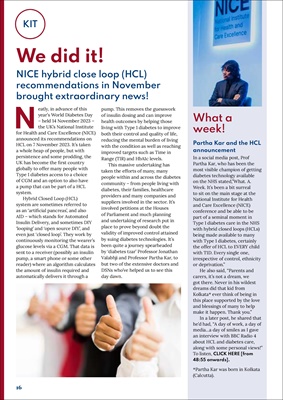
16KIT
What a
week!
Partha Kar and the HCL
announcement
In a social media post, Prof
Partha Kar, who has been the
most visible champion of getting
diabetes technology available
on the NHS stated,"What. A.
Week. It's been a bit surreal
to sit on the main stage at the
National Institute for Health
and Care Excellence (NICE)
conference and be able to be
part of a seminal moment in
Type 1 diabetes care in the NHS
with hybrid closed loops (HCLs)
being made available to many
with Type 1 diabetes, certainly
the offer of HCL to EVERY child
with T1D. Every single one,
irrespective of control, ethnicity
or deprivation."
He also said, "Parents and
carers, it's not a dream, we
got there. Never in his wildest
dreams did that kid from
Kolkata* ever think of being in
this place supported by the love
and blessings of many to help
make it happen. Thank you."
In a later post, he shared that
he'd had, "A day of work, a day of
media...a day of smiles as I gave
an interview with BBC Radio 4
about HCL and diabetes care,
along with some personal views!"
To listen, CLICK HERE [from
48:55 onwards].
*Partha Kar was born in Kolkata
(Calcutta).
We did it!
NICE hybrid close loop (HCL)
recommendations in November
brought extraordinary news!
Neatly, in advance of this
year's World Diabetes Day
- held 14 November 2023 -
the UK's National Institute
for Health and Care Excellence (NICE)
announced its recommendations on
HCL on 7 November 2023. It's taken
a whole heap of people, but with
persistence and some prodding, the
UK has become the first country
globally to offer many people with
Type 1 diabetes access to a choice
of CGM and an option to also have
a pump that can be part of a HCL
system.
Hybrid Closed Loop (HCL)
system are sometimes referred to
as an 'artificial pancreas', and also
AID - which stands for Automated
Insulin Delivery, and sometimes DIY
'looping' and 'open source DIY', and
even just 'closed loop'. They work by
continuously monitoring the wearer's
glucose levels via a CGM. That data is
sent to a receiver (possibly an insulin
pump, a smart phone or some other
reader) where an algorithm calculates
the amount of insulin required and
automatically delivers it through a
pump. This removes the guesswork
of insulin dosing and can improve
health outcomes by helping those
living with Type 1 diabetes to improve
both their control and quality of life,
reducing the mental burden of living
with the condition as well as reaching
improved targets such as Time in
Range (TIR) and HbA1c levels.
This massive undertaking has
taken the efforts of many, many
people within and across the diabetes
community - from people living with
diabetes, their families, healthcare
providers and many companies and
suppliers involved in the sector. It's
involved petitions at the Houses
of Parliament and much planning
and undertaking of research put in
place to prove beyond doubt the
validity of improved control attained
by suing diabetes technologies. It's
been quite a journey spearheaded
by 'diabetes tzar' Professor Jonathan
Valabhji and Professor Partha Kar, to
but two of the extensive doctors and
DSNs who've helped us to see this
day dawn.